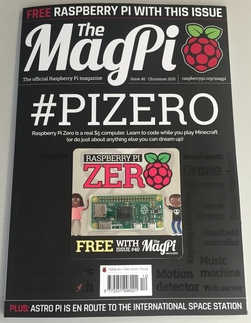Every month it seems like the Raspberry Pi Foundation keeps wowing us, and this November was no exception. As a matter-of-fact, this past month was jam packed with headlines, so much so that I’m eagerly waiting to see what the month of December will offer. Since there was so much that happened, here is a recap of the biggest stories that headlined the Raspberry Pi for the month of November.

Official books released: Not only was The MagPi busy shipping the Pi Zero with its magazine, they were also part of a two book release. The first book, Conquer the Command Line, is a great read for anyone who finds themselves stuck while operating from a terminal. This book does a great job of covering both basic and advanced topics. The second book, The Official Raspberry Pi Projects Book, is another great read for anyone not sure what to do with their Raspberry Pi. With over 200 pages of code and illustrations, this book is sure to provide the inspiration you need to get started on a project. Both books, part of a series of ebooks called “The MagPi Essentials,” can be bought if you would like to support The MagPi and the work they do, but The MagPi folks don’t ever want money to be an issue, so both can be downloaded for free as well.
Raspberry Pi and Code Club unite: This story really shows what the Raspberry Pi is all about. Code Club is a volunteer led after school club that teaches children between the ages of 9-11 about the basics of programming and how to code. Since the Raspberry Pi was created to introduce children to computer science through easy and fun concepts, this makes the pairing of the two a match made in heaven. Both are all about the betterment of children through computers and fun, and one compliments the other. If this inspires you, then I encourage you to reach out to Code Club to see if you can volunteer to teach or even start a Code Club in your community.
GPIO Zero 1.0 release: Coding with the RPi.GPIO Python library is a labor of love. This Python library has long been the de facto way most of us communicate with the GPIO pins and it’s not the easiest of libraries to understand. To better assist the GPIO pin coding process, Ben Nuttall has created GPIO Zero. This amazing library greatly reduces the overhead and confusion that came with the RPi.GPIO library. Recently, GPIO Zero celebrated it’s 1.0 feature release, which I’m sure is the first of many more to come. Make sure to try out GPIO Zero the next time you find yourself trying to work with the GPIO pins.
Astro Pi website launched: In the coming months, two Raspberry Pis will be sent to the International Space Station. Both Raspberry Pis are part of the Astro Pi project, which is British Astronaut Tim Peake using Raspberry Pis to conduct experiments created and coded by school students. Due to how much information revolves around this project, the Raspberry Pi Foundation has launched the Astro Pi website. This website contains a plethora of information such as the competition that started it all, how to download the code/projects that will be used on the ISS, how to watch the launch and also how to purchase the hardware involved.
Help keep FOSS Force strong. If you like this article, become a subscriber.
In addition to hosting a Raspberry Pi meetup in Washington D.C., Isaac Carter is a co-host on mintCast. He’s also a software engineer who enjoys working with Java, JavaScript, and GNU/Linux. When he’s not coding, you can find him reading on any number of subjects or on the golf course.









The Raspberry Pi Zero is a great advancement.
The only downside is the removal of the analog audio jack, meaning if your project is a home audio or other non-hdmi audio solution, then the Pi Zero will not fill that role without the purchase of a third-party DAC add-on, which brings the cost up to or greater than a full-blown Raspberry Pi.